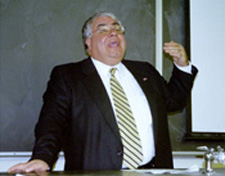Set up a democratic government and then leave quickly.
This is the course of action that Ernad Wajeeh, an Iraqi-American and professor at the University of New Orleans, said that the United States should take in Iraq.
“Yes, we support our men and women in uniform, out of compassion and love for our children,” Wajeeh said. “But we as a country are divided on this war.”
Wajeeh, who is the president of the National Association of Arab-Americans, spoke to a handful of students Monday night to give insight into the war in Iraq from an Arab perspective.
Wajeeh presented the war and the events that led up to it against the rich backdrop of Saddam Hussein’s rise to power, as well as the Iraqi government’s changing relationship with the United States.
Wajeeh, like many Iraqis, is quick to denounce Saddam.
“He is no saint, definitely a criminal,” Wajeeh said. “I myself was jailed in 1971. I was going to the movies and was arrested for telling a stupid joke against the government.”
Wajeeh had a relative in the government and was quickly released unharmed, but he witnessed the torturous interrogations going on inside the jail.
Though he has been living in the United States since 1975, he still has siblings living in Iraq.
About two weeks ago he spoke with his sister and could hear coalition bombing in the background.
When asked about how his family members who are still in Iraq feel about Saddam, he said, “they hate Saddam.”
But despite much of Iraq’s strong dislike for the Iraqi leader, Wajeeh said, “They (the Iraqi people) will tell you that what the U.S. is doing is not going to give you prosperity to the region.”
Confusion over whether to embrace the war in Iraq is also ringing across other parts of the Arab-American community.
Pegah Kannar, pre-med sophomore, whose family is from Iran, said that she is against the war, but that her father’s position mimics that of so many other Arab-Americans.
“He doesn’t like the idea that civilians are being killed, but he thinks that Saddam has to go,” she said.
Wajeeh also views the fighting in Iraq with some skepticism.
“Saddam is horrible. Yes we want to get rid of Saddam, but is this the way to do it? To go and massacre a whole nation?” he said.
Stephanie Margherio, English literature senior, asked Wajeeh about any negative experiences he and his family encountered.
He said that there has been some FBI inquiry into his Arab organization.
“On the day that the war started, the FBI started asking Iraqi-Americans questions,” he said. “Guilt by association. Saddam is Iraqi, and you are Iraqi.”
If both the Iraqi and the American people find it difficult to understand the United States’ motives behind a regime change in Iraq, this may be in part because over the last 20 years the United States has moved from supporting Saddam to overthrowing him.
Going back to the 1980s, Wajeeh recalled that United States provided Iraq with bio-weapons, and since 1973, Iraqi students traveled to countries like the United States, France, Italy and Australia to learn nuclear technology.
During this same time, Wajeeh said that Saddam also required everyone in Iraq to receive an education, sometimes forcing people at gun-point to attend school.
Because of his dictatorial approach to education, Wajeeh said that Iraq now has a 95 percent literacy rate.
He cited the growth of the pro-Israeli lobby in the Unites States, backed by not only the Jewish community, but also conservative Christians like Jerry Falwell and Pat Robertson, that changed the United States’ attitude toward the Middle-East.
In fact, Wajeeh said that during the Shiite Muslim uprising against Saddam at the end of the first Gulf War, that the reason that former President Bush did not provide assistance was because he did not want to encourage an Islamic control of the region.
Valerie Brown, psychology junior, asked Wajeeh about how much of a price he believes the Americans are willing to invest into Iraq after the war.
Wajeeh said that the best thing that America can do to help the Iraqis install a democratic government and then leave quickly.







